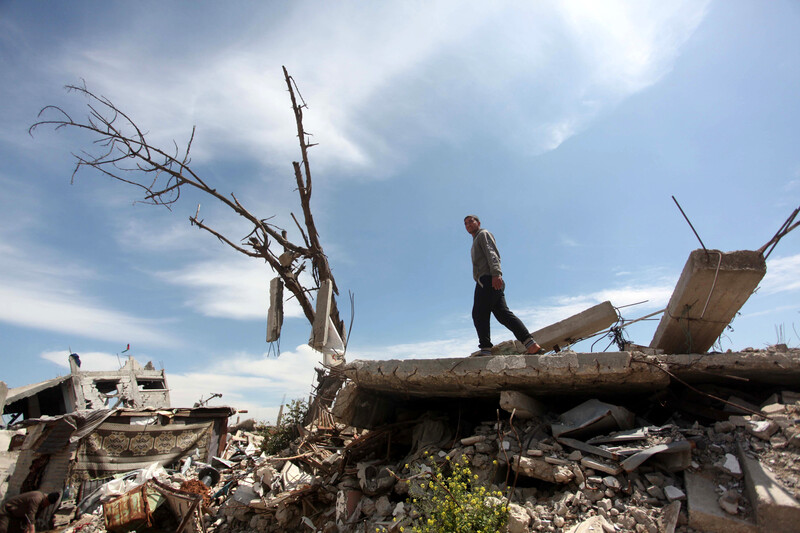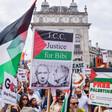Rights and Accountability 11 December 2019

A Palestinian man walks across the rubble of his home destroyed during Israel’s 51-day bombardment of the Gaza Strip in the summer of 2014, al-Shujaiyeh, Gaza City, April 2015.
APA imagesIn the decade since Palestinians first petitioned the International Criminal Court, around 3,500 Palestinians have been killed by Israeli occupation forces in the West Bank and Gaza Strip.
Around 800 were children.
Israel has expanded its settlement colonies in the West Bank, encouraged by a Trump administration that has put Washington’s seal of approval on war crimes only tacitly endorsed by previous US governments.
That tacit support has been more than symbolic.
Trump’s predecessor, Barack Obama, signed a $38 billion military aid pact with Israel – the “single largest pledge of bilateral military assistance in US history” by the State Department’s admission.
All that to secure Israel’s military occupation, now in its sixth decade, and the violent oppression that it requires.
The Gaza Strip has remained under a cruel and illegal siege of collective punishment, all but destroying the economy and plunging the territory’s population of two million into poverty and unprecedented despair.
In 2014, Israel subjected Gaza to a 51-day military assault, during which nearly 150 families lost three or more members in a single Israeli strike as Israel targeted homes, schools, hospitals and other civilian infrastructure.
Two years later, B’Tselem, Israel’s leading human rights organization, declared that it would no longer cooperate with the Israeli military’s sham system of self-investigation, stating that it only serves as a fig leaf for the occupation.
The UN Human Rights Council tasked several independent commissions of inquiry to investigate Israeli crimes in Gaza. They published their reports, but their calls for accountability were ignored or undermined by those in a position to challenge Israeli impunity.
The international boycott, divestment and sanctions movement, which seeks to pressure Israel into respecting Palestinian rights, has been put in the crosshairs of Israel’s strategic affairs ministry.
Palestinian leaders of that popular movement have been punished and threatened, while international BDS supporters are criminalized and smeared.
The preliminary examination of the situation in Palestine by the chief prosecutor of the International Criminal Court has provided a glimmer of hope in this otherwise bleak landscape.
But anyone concerned with justice in Palestine should be alarmed by the chief prosecutor’s latest progress report on the preliminary examinations in the West Bank and Gaza and elsewhere.
In it, chief prosecutor Fatou Bensouda states that she “believes that it is time to take the necessary steps to bring the preliminary examination to a conclusion.”
“Distorted quest for balance”
Since 2015, Bensouda has been conducting the preliminary examination into alleged war crimes in the occupied West Bank and Gaza Strip. She has yet to open any formal investigations that could lead to prosecutions.
“The delay in proceeding to investigation … is of grave concern,” three Palestinian human rights groups state in a response to Bensouda’s report, published last week.
The groups – Al-Haq, Al Mezan and the Palestinian Center for Human Rights – say that the section on the situation in Palestine in Bensouda’s report contains “a number of unwarranted and disturbing omissions.”
These include falsely equating Israeli military snipers and Palestinian protesters, mischaracterizing Gaza’s legal status under international law, and the failure to note Israel’s illegal annexation of Jerusalem.
“Throughout the report, both Israel and Palestine are treated as two equal parties to an ongoing conflict,” the rights groups state, adding that “the failure to adequately address the context is misleading.”
“The situation is one of a 52-year prolonged belligerent occupation, where one party to the conflict, Israel the Occupying Power, has subjugated the occupied population, who remain under its effective control and administration,” the groups state.
“This places certain obligations on Israel, and the violation of laws governing its administration of the occupied territory, possibly amounting to grave breaches and war crimes, with some acts reaching the threshold of crimes against humanity.”
In Bensouda’s report, violations against the entire Palestinian population carried out in the context of Israel’s occupation, including crimes against humanity, are immediately followed by allegations of human rights violations in Palestinian detention centers.
The rights groups state that human rights violations in areas controlled by the Palestinian Authority, while serious and may amount to war crimes, likely do not “amount to a policy or plan reaching the threshold of widespread or systematic attack against the civilian population.”
“The inclusion of [crimes against humanity] for both parties has all the hallmarks of a distorted quest for balance,” the groups add.
Adopting Israel’s legal framework
Meanwhile, Bensouda describes Gaza as an area of ongoing hostilities, rather than as being under the control of Israel. By doing so, she breaks from the international consensus on Gaza’s status as an occupied territory.
“As such, the report feeds into Israel’s fragmentation of the occupied Palestinian territory, for the purposes of its colonialist territorial expansion,” the Palestinian human rights groups state.
Bensouda’s report also suggests that the prosecutor is applying the framework of international humanitarian law – the laws of armed conflict – to Israel’s use of live fire against Palestinians during Great March of Return protests along Gaza’s perimeter.
More than 210 Palestinians have been killed during the protests, including nearly 50 children, and thousands more maimed by sniper fire since their launch on 30 March 2018.
Bensouda’s is the same legal framework advanced by Israel to justify its use of lethal force against Gaza protesters by saying that the demonstrations and Israel’s deadly crackdown are part of an armed conflict with Hamas.
An independent commission of inquiry launched by the United Nations, as well as Palestinian human rights groups, have refuted this.
They say that the mass demonstrations along Gaza’s boundary with Israel are a civilian matter of law enforcement governed by international human rights law. The killing and maiming of protesters cannot be excused by claiming that they took place during an armed conflict.
The same UN inquiry prepared confidential dossiers on alleged perpetrators of international crimes related to the Great March of Return, so they may be submitted to the International Criminal Court.
But that request has not been executed, according to Al-Haq, Al Mezan and the Palestinian Center for Human Rights.
“Given the potential access of the office of the prosecutor to all the collected evidence of the commission of inquiry, the failure to obtain this evidence undermines the credibility of the court’s examination,” the rights groups state.
Santiago Canton, the head of the commission, said plainly in February: “These violations clearly warrant criminal investigation and prosecution.”
Bensouda has already stymied accountability for international crimes committed by Israel.
Last week, the chief prosecutor declared she is standing by her 2015 decision not to open an investigation into Israel’s deadly storming of the Mavi Marmara in international waters – despite the court’s judges telling her twice to reconsider.
In 2010, Israeli commandos fatally wounded 10 people aboard the Mavi Marmara after raiding the ship, which was part of a civilian humanitarian flotilla headed towards Gaza.
In that case too, as noted by my colleague Ali Abunimah, her argument reads more “like a brief from a defense attorney for Israel rather than from a prosecutor seeking to end impunity for international crimes.”
However flawed Bensouda’s report on the preliminary examination on Palestine may be, Israel’s attorney general has warned that annexation of the West Bank’s Jordan Valley – as recently promised by Prime Minister Benjamin Netanyahu – may expose senior Israeli officials to prosecution by the International Criminal Court.
What’s certain is that Palestinians will never receive justice in Israeli courts, and Israeli soldiers enjoy total impunity for violating Palestinians’ human rights, as do the civilian and military leaders who shape the policies they execute.
Two Israeli human rights groups separately issued publications and a database this week emphasizing that truth that Bensouda must not ignore.
In the words of a Palestinian mother whose 13-year-old daughter was shot in the head and killed in 1989, with the army denying any responsibility: “When the judge is your enemy, who can you complain to?”
More than justice for Palestine is at stake with Bensouda’s decision whether to open a formal investigation. At risk is “the reputation of impartiality and independence of the court,” as Al-Haq, Al Mezan and the Palestinian Center for Human Rights point out.
That reputation is, however, already tattered: Since its founding, the court has only ever prosecuted citizens of African countries. That has prompted accusations of colonialism and racism and a call by the African Union on its member states to withdraw from the court.
A group of Palestinian, regional and international human rights groups stated in March, marking the one-year anniversary of the Great March of Return: “Being the longest unresolved question to fall under the responsibility of the UN, Palestine has … become a litmus test for the efficacy of the international system as a whole.”
Will the International Criminal Court and its chief prosecutor pass the test? Or will Israeli impunity win out again?






Comments
Impunity
Permalink Frank Dallas replied on
Israeli impunity. Indeed. What is its source? The slander on humanity that the Jews always have been a persecuted people. This is glibly accepted by many as a fact. The truth is the Jews have suffered periods of persecution but also times of acceptance. Further, the claim that the Jews are the chosen people. God has singled them out. Then the muddling of terms. Who is a Jew?,as Isaiah Berlin asked. Is it a religious definition, a nationality, an ethnic category.Weizmann believed the Jews are a race. He was hardly insignificant. How does his definition fit with the religious category or the matter of nationality? This fuzziness of definition is what permits Zionists to claim every criticism is antisemitic. As Noam Chomsky has recently said: "Why should Jewish groups be immune from criticism, alone in the world?"
The claim that anti-Zionism is antisemitic would be simply laughable if it didn't have such dire real world consequences. We must never tire from defining Zionism as what it is: a political creed.
The Zionist slander that the any criticism of its aims is the same as hatred of Jews as Jews feeds even into international law. The law should be robust enough to make the correct distinction; but Israel is so crucial to the world order, everything about the conflict, everything about what is or isn't antisemitic gets distorted. It is a Kafkaesque labyrinth, but in the long run it will be exposed for the shabby injustice it as. No one believes any more that criticising the divine right of kings is heresy. Nor will anyone a century from now believe that rejection of Zionism was antisemitic.